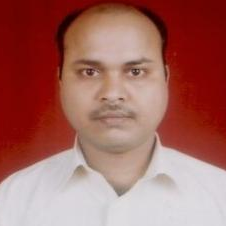
D.P. Tripathy
Work place: Department of Mining Engineering, National Institute of Technology, Rourkela, Odisha, India
E-mail: debi_tripathy@yahoo.co.in
Website:
Research Interests: Computational Science and Engineering, Computational Engineering, Computer Architecture and Organization, Data Mining, Engineering
Biography
Dr. Debi Prasad Tripathy (1966) is currently working as Professor and Former Head in the Department of Mining Engineering at National Institute of Technology, Rourkela, Odisha, India. He did his B.E. (Min.) from VNIT, Nagpur; M.Tech. (Mine Planning) from I.T., B.H.U., Varanasi; Ph.D. (Mine Environment) from Indian School of Mines, Dhanbad. His current areas of teaching and research are: Mine Environment and Safety Engineering, Mine Planning, Computer Applications in Mining and Mine Management.
He has published five books on Environmental Science and Engineering published by M/s APH Publishers, New Delhi. He has published over 120 technical papers in International/ National Journals and Conferences/Seminars. He has been awarded with Deokhas Prize from Nagpur University for academic excellence, honored with “MSPI Outstanding Personalities Award-1998”, New Delhi; UWA Life time Achievement Award”, Chennai . He has been honored with Gold medals and citations for Best Paper from I.E. (I), OSC, Bhubaneswar. In recognition of his research contributions, he has been selected as member, Editorial Board of Journal of Pollution Research (EnviroMedia), India; International Journal, JGMR; International Journal of Earth Science Engineering., and Peer Reviewer of several International Journals. He has visited Australia, USA, Canada, Papua New Guinea, Dubai, South Africa, Botswana, Singapore and Thailand on various academic assignments. He is a Fellow of ISRMTT, IE (I), UWA, and member of other prestigious professional societies like MEAI, ISTE, IMJRF, IAEM, MMGI and ASEG.
Author Articles
Development of Regression Models for Assessing Fire Risk of Some Indian Coals
By Devidas S. Nimaje D.P. Tripathy Santosh Kumar Nanda
DOI: https://doi.org/10.5815/ijisa.2013.02.06, Pub. Date: 8 Jan. 2013
Spontaneous combustion of coals leading to mine fires is a major problem in Indian coal mines that creates serious safety and mining risk. A number of experimental techniques based on petrological, thermal and oxygen avidity studies have been used for assessing the spontaneous heating liability of coals all over the world. Crossing point temperature (CPT) is one of the most common methods in India to assess the fire risk of coal so that appropriate strategies and effective action plans could be made in advance to prevent occurrence and spread of fire and hence minimize coal loss. In this paper, the spontaneous heating risks of some of the Indian coals covering few major coalfields were assessed using CPT apparatus. Statistical analysis was carried out between CPT and the proximate analysis parameters and it was found that the Mixture Surface Regression (MSR) model was more effective and gave very good residual values as compared to the polynomial and simple multiple regression models. The performance of Anderson-Darling testing was done between the prediction results of MSR model and measured value of CPT showed that the residual follows normal distribution hence justifies the suitability of model for the prediction of spontaneous heating liability of coal.
[...] Read more.Other Articles
Subscribe to receive issue release notifications and newsletters from MECS Press journals